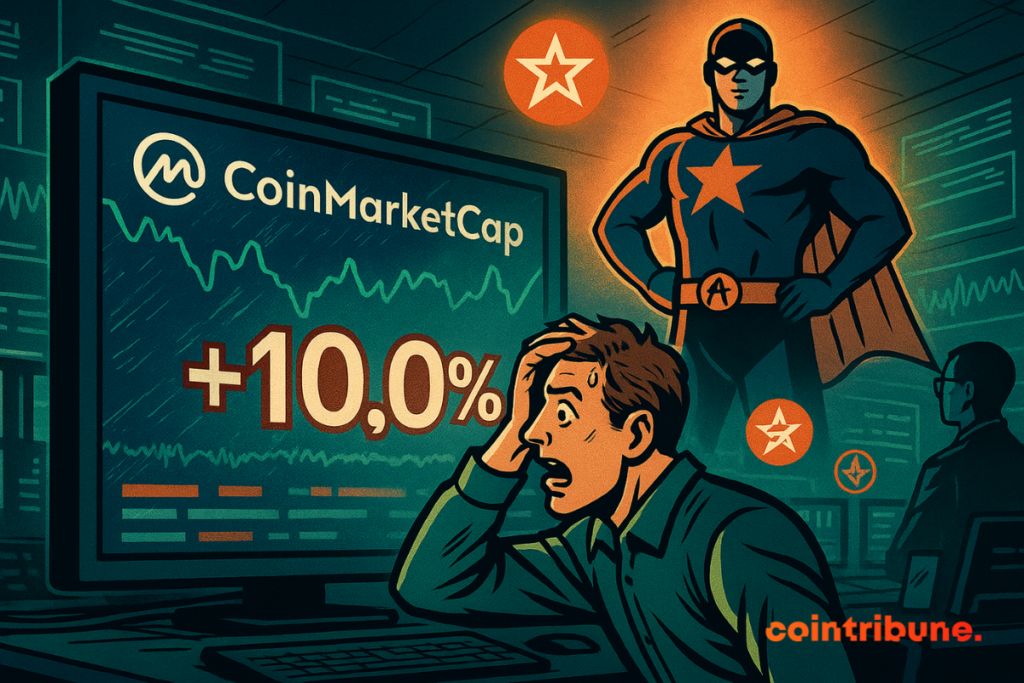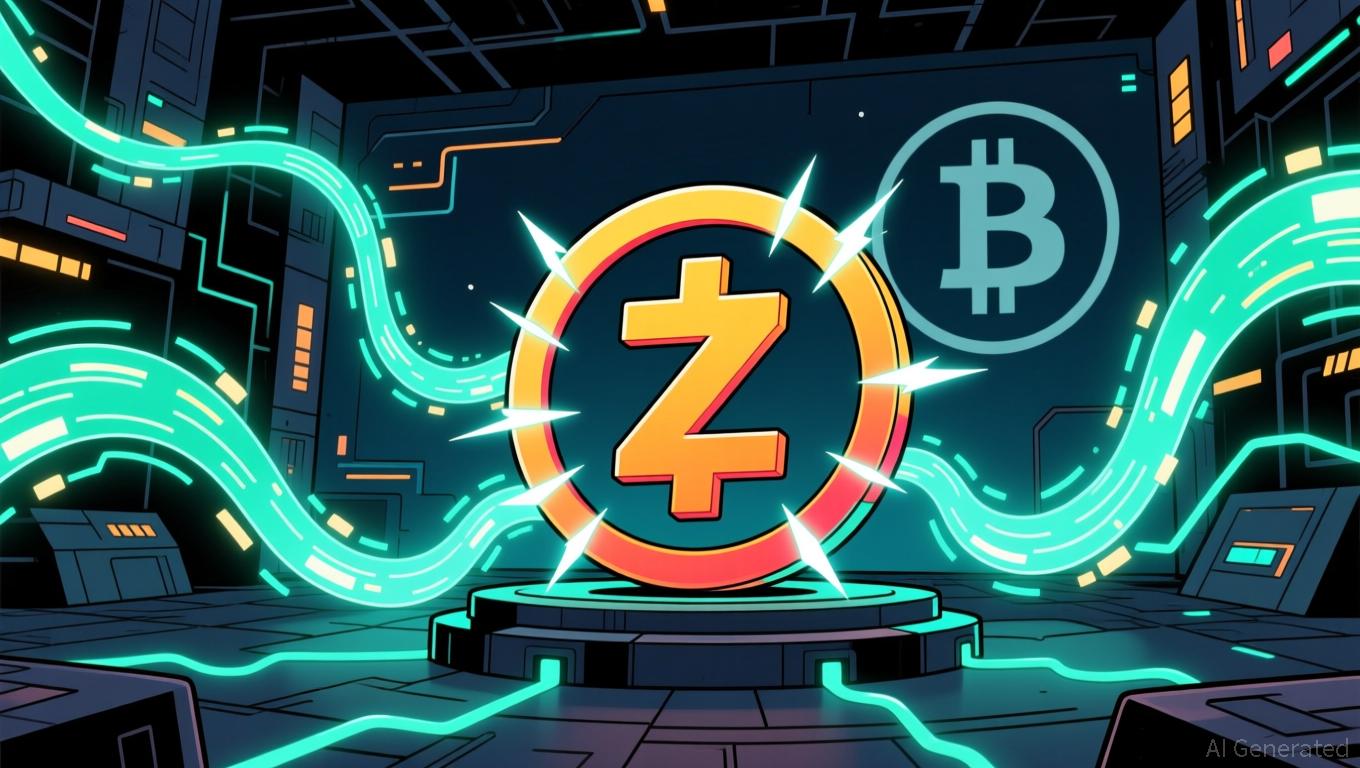After the confusion on CMC, Aster reassures and jumps +10%
While the crypto industry takes wave after wave, Aster recently caused unexpected turmoil. The cause: a CoinMarketCap update that disrupted token unlock forecasts. Speculations immediately soared. Yet, to everyone’s surprise, this turmoil turned into an opportunity for the project. Aster clarified its position, enhanced transparency, and… the market reacted. A +10% rise amid a crypto crisis? That’s worth a closer look.

In brief
- An update on CMC sparked panic about ASTER token unlocks.
- Aster responded by promising transparency via a public wallet to track unlocked funds.
- CZ revealed he invested 2.5 million dollars in the altcoin from his personal wallet.
- ASTER’s price jumped from $0.91 to $1.17 in just a few days.
When a CMC update triggers a crypto panic wave
Already, the fear index is at its lowest, fallen to 10 … and suddenly ASTER holders discover, at the end of October, a massive delay in unlocks on CoinMarketCap: mid-2026, even 2035. The crypto community was caught off guard. Concern quickly rises . Some wonder about a possible policy change.
The response comes from @Aster_DEX:
A recent update of ASTER’s tokenomics on CoinMarketCap (CMC) caused confusion within the community. This confusion stems from a misunderstanding, and we sincerely apologize for the inconvenience caused. We want to clarify that ASTER’s tokenomics have not changed.
In reality, tokens were indeed planned to be unlocked each month. But lacking a usage plan, they never left the locked address. No impact on circulating supply, therefore. The project only provided an updated display, which was misinterpreted. And in such a fragile crypto market, this kind of misunderstanding is enough to cause panic.
Aster: enhanced transparency, public wallet, and regained trust
To prevent any recurrence, the Aster team takes an unprecedented decision: making public the unlocked but unused funds. These tokens will be transferred to a specific address, visible and traceable by all.
They state:
We currently have neither the need nor intention to spend funds from this address. We will continue to demonstrate transparency with the community regarding the use of these funds in the future.
This gesture of openness is quite rare in the crypto universe, often criticized for its opaque areas. It places Aster in a defensive, but also proactive stance. Compared to other altcoins, like Arbitrum or Optimism, which sometimes face distrust about their internal management, Aster takes the initiative.
This change in dynamics allows the project to regain credibility. Caution remains, but some traders praise the team’s clarity.
CZ bets on Aster: domino effect in the altcoin universe
On November 11, a tweet causes a shockwave. Changpeng Zhao, aka CZ, Binance’s founder, announces outright that he just bought Aster with his own money on the platform. He specifies that he is not a trader, but a long-term investor, affirming that he buys and holds his positions.
It’s the first time CZ admits publicly investing in a token other than BNB. Result: the price rises from $0.91 to $1.26 in a few hours. Some see it as an unofficial green light. One trader even comments that the market’s behavior gave the impression that CZ sold his BTC to go all in on ASTER.
This announcement supports an already favorable technical setup. The price had rebounded from a solid base at $0.85, then broke through a downtrend line. According to analysts, a target between $1.90 and $2.70 becomes credible.
Key figures and facts to remember
- ASTER price at the time of writing: $1.17;
- Highest recorded price: $2.42 (September);
- Post-CZ increase: +35% in one day;
- Amount publicly invested by CZ: 2.5 million dollars;
- CMC announcement date: November 15, 2025.
Recently, Aster was added to Coinbase’s listing roadmap . In the ultra-competitive altcoin universe, such institutional recognition carries significant credibility. At a time when most of the crypto market battles distrust, Aster seems to be taking the lead, slowly but surely.
Disclaimer: The content of this article solely reflects the author's opinion and does not represent the platform in any capacity. This article is not intended to serve as a reference for making investment decisions.
You may also like
Zcash Updates Today: Cypherpunk Invests $150M in Zcash—A Bold Move for Privacy?
- Zcash (ZEC) surges 140% amid crypto slump, outperforming Bitcoin as institutional demand grows. - Cypherpunk Technologies , backed by the Winklevoss twins, bought $18M in Zcash, boosting its holdings to 1.43% of the supply. - Privacy-focused Zcash gains traction as Bitcoin ETF adoption rises, with analysts projecting a 40% price rally if $690 resistance breaks. - Regulatory shifts and exchange relistings fuel optimism, though critics warn of hype-driven gains and Bitcoin's market dominance risks.

Bitcoin News Update: Positive On-Chain Signals Stand Out Amid Crypto Price Drops and Regulatory Challenges
- Bitcoin's price drops below key levels, while XRP shows increased on-chain activity amid market uncertainty. - Bitwise XRP ETF sees $107M inflow, but XRP remains below $2 during prolonged correction. - Global regulators intensify scrutiny, with UK tracing crypto-linked drug funds and US pushing for bitcoin ETF approval. - DeFi faces $12B liquidity crisis and security threats, highlighting systemic vulnerabilities.

The COAI Token Controversy: Exposing Weaknesses in DeFi and Charting a Course for Safeguarding Investors
- COAI token's 2025 collapse wiped $116.8M, exposing DeFi's fragility due to governance flaws, regulatory gaps, and technical vulnerabilities. - Smart contract failures and concentrated ownership in ten wallets amplified manipulation risks, eroding trust in C3.ai's leadership. - Regulatory ambiguity, like the U.S. CLARITY Act's vague definitions, hindered institutional investment and enabled scams in Southeast Asia. - Experts urge real-time audits, diversification into AI hardware, and global frameworks li
Bitcoin Updates: Bitcoin's Sharp Drop Contrasts with Japan's Economic Stimulus Amid Global Liquidity Puzzle
- Bitcoin fell to a seven-month low below $85,500, triggering $3.79B in ETF outflows as bearish technical signals and Fed rate-cut uncertainty deepened selling. - Japan's $135.4B stimulus package, its largest since 2020, sparked debate over whether liquidity injections or global deleveraging would dominate market sentiment. - BlackRock's IBIT led redemptions with $2.47B losses, while Bitcoin's "death cross" pattern and broken support levels intensified investor caution. - Market analysts split between altc

